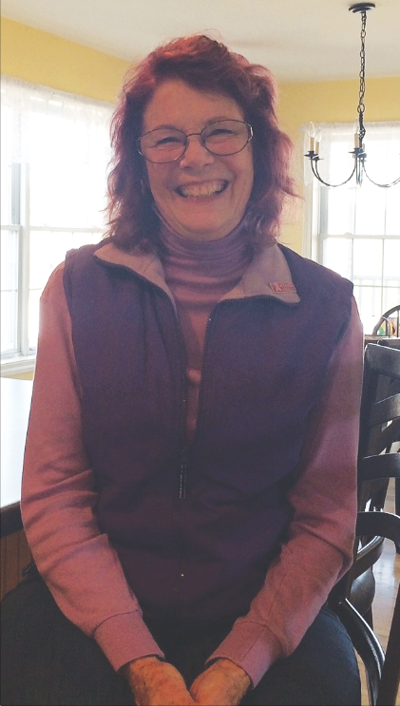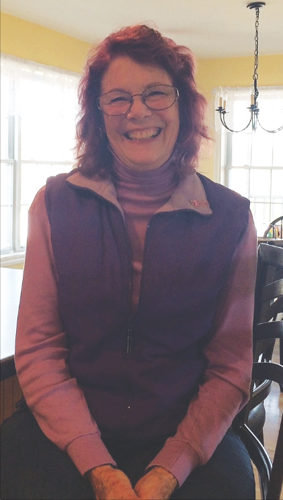Suzan Letwenski is passionate about finding ways to prevent cancer and cure it. Her specialty is pushing for state and federal legislation that can help in that fight.
Letwenski, who is retired and lives in Morristown, became involved with the American Cancer Society Cancer Action Network after her husband, Bob, was diagnosed with cancer.
Last fall, Letwenski traveled to Washington, D.C., with the action network to ask members of Congress to support federal legislation affecting cancer patients.
This Wednesday, she took her fight to the Vermont Statehouse.
She joined dozens of cancer patients, survivors and their families from throughout Vermont to ask lawmakers to support tax legislation affecting tobacco and sugar sweetened beverages, as well as funding for the state’s Ladies First program, which provides mammograms and pap smears to low-income women.
The Legislature reduced funding for the program last year and Letwenski and other action network members are asking that it be restored.
“Early detection is a godsend,” Letwenski said. “It’s just common sense. Find those cancer cells early and you’ll be able to treat it before you have radical mastectomies costing thousands of dollars.”
This year, the American Cancer Society projects that over 4,000 Vermonters will be diagnosed with cancer and an estimated 1,360 will lose their battle with the disease.
In addition to lobbying, Letwenski works to raise money for cancer research and prevention.
She has participated in Relay for Life NordicStyle, an annual overnight fundraiser for the American Cancer Society, every year since 2005.
The event, which draws participants to Stowe from throughout New England, raised $63,000 this year and has raised as much as $98,000.
Personal battle
For Letwenski, her battle to help prevent and find a cure for cancer is personal.
Her husband, Robert, a retired steelworker, has battled cancer twice.
In 2001, he was diagnosed with non-Hodgkins lymphoma. Doctors used eight rounds of targeted chemotherapy drugs to attack the cancer, hammering it into remission.
In 2005, he was diagnosed with prostate cancer, which was successfully treated with radioactive seeds.
“The biggest challenge as a caregiver is fear,” Letwenski said. “Fear of not only the disease becoming active, but of losing your loved one.”
Robert, 76, has regular checkups to make sure the cancer hasn’t returned.
“Because it’s such a mystery and a gamble, once a year we do CAT scans and bloodwork and that’s the worst week of the year, because the results will tell us if we’re still benign or active,” Letwenski said.
Taxing bad habits
“We desperately need to increase the (state) tobacco tax,” Letwenski said. “It’s a given that the use of tobacco products causes cancer.”
She also supports legislation to tax sugar-sweetened beverages. Obesity suppresses the body’s immune system, making obese people more prone to cancer, according to Letwenski.
“It also affects your heart,” Letwenski said. “It affects everything in your life.”
The proposed taxes might not convince Vermonters to stop buying these products altogether, but it could cut down on consumption, especially among people with lower incomes, she said.
“It’s a step in the right direction,” Letwenski said.
Education is important
While the Affordable Care Act gave health coverage to more Americans, it hasn’t necessarily guaranteed that cancer patients will receive the best available care, Letwenski said.
“The availability of cancer care is still based on economics,” Letwenski said. “The more you can afford, the better care you will receive.”
For instance, many cancer patients don’t have access to palliative care, which she said is “an all-encompassing care system and it’s team-oriented, so patients have greater access to answers, physicians and care beyond their medical needs, from diagnosis forward.”
She offers this advice to patients recently diagnosed with cancer, and to their families:
“Find a patient advocate and get educated about not only your disease, but the resources and the supports that are available to you. That can be done through your local hospital or by going through cancer.org. It’s very important as you go through treatment and survival.”



(0) comments
Welcome to the discussion.
Log In
Keep it clean. Please avoid obscene, vulgar, lewd, racist or sexual language.
PLEASE TURN OFF YOUR CAPS LOCK.
Don't threaten. Threats of harming another person will not be tolerated.
Be truthful. Don't knowingly lie about anyone or anything.
Be nice. No racism, sexism or any sort of -ism that is degrading to another person.
Be proactive. Use the "Report" link on each comment to let us know of abusive posts.
Share with us. We'd love to hear eyewitness accounts, the history behind an article.